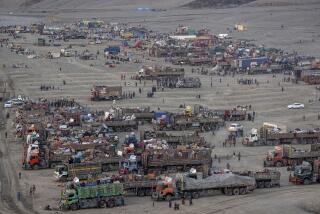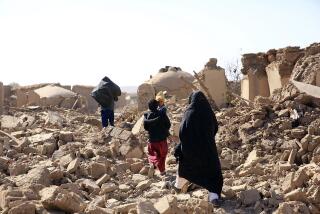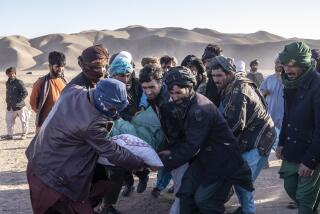Civilian casualties up sharply in Afghanistan as U.S. departure nears
Accelerating a grim trend in the evolving war in Afghanistan, civilian casualties rose sharply in the first half of this year due to heavier ground combat between government forces and insurgents in populated areas, the United Nations reported Tuesday.
Through the end of June, the U.N. mission in Afghanistan documented 1,564 civilian deaths and 3,289 injured. The total represented a 24% increase over the same period last year and was particularly devastating for children, whose casualties as a result of ground operations more than doubled.
The statistics were a reminder that the hostilities are far from over even as U.S.-led international forces prepare to depart the country by the end of the year. Afghanistan also is mired in a tense standoff over a disputed presidential election that threatens to unleash violence between rival political camps and ethnic groups.
“In 2014 we found that the fight is increasingly taking place in communities, in public places near playgrounds and near the homes of ordinary Afghans,” Georgette Gagnon, the U.N. human rights director in Kabul, said in releasing the twice-annual report.
“More efforts are needed to protect civilians from the conflict and to ensure accountability for those who are deliberately and indiscriminately killing them.”
Underscoring the continued threat of Taliban violence, twin attacks in Kandahar province on Wednesday morning left 31 people dead, including 22 insurgents who attempted to storm the offices of the provincial governor and police headquarters, local officials said.
It was the first time since the U.N. began closely tracking civilian casualties in 2009 that ground combat was the No. 1 killer, resulting in a greater number of casualties from mortar rounds, rocket-propelled grenades and small-arms fire. As in the past, the lion’s share of the casualties — 74% — was attributed to anti-government forces.
As the U.S.-led military coalition has closed scores of bases or handed them over to Afghan forces, the dynamics of the conflict have changed, with the Afghan soldiers and police often unable to keep Taliban and allied insurgents from moving into territory vacated by the foreign forces, the report found. In the second half of 2013, the coalition closed or transferred at least 86 bases, which had a direct impact on civilian safety, with fighting in populated areas increasing when Afghan forces tried to protect territory seized by insurgents, the U.N. said.
“In some areas the perceived lack of control by Afghan security forces appeared to encourage anti-government elements to bring together larger attack groups which resulted in higher civilian casualties,” the report said.
In the past, most civilians have been killed or injured in bomb attacks, which so far this year were responsible for the second-most casualties – although those, too, were higher than in the same period last year. Improvised explosive devices killed 463 civilians and injured 1,000, a 7% jump from last year and the most since 2009.
The U.N. also found a worrying rise in deaths and injuries from pressure-plate bombs, a low-tech device designed to detonate when a vehicle drives over it, reversing a decline seen last year. The devices accounted for one in five casualties from bomb attacks, according to the report.
In Kandahar, 11 armed men targeted the entrance to the governor’s office around 11 a.m. Wednesday, according to Dawa Khan Minapal, a spokesman for the governor. One detonated a suicide vest and was killed instantly, while 10 others were shot and killed by Afghan security forces.
Meanwhile, 11 more attackers struck the police headquarters in the same fashion and were killed, but not before they detonated a vehicle packed with explosives in the police parking lot. Five police officers and four civilians were killed in the attack, and a total of 16 people were wounded, officials said.
Kandahar has long been a hotbed of Taliban violence. But the provincial police chief, Abdul Raziq, said in a statement that the attackers did not speak the local language, Pashto. Rather, they appeared to be from neighboring Pakistan. He said an investigation into the attacks was under way.
Special correspondent Baktash reported from Kabul and Times staff writer Bengali from Mumbai, India.
For more news from Afghanistan and South Asia, follow @SBengali on Twitter
More to Read
Start your day right
Sign up for Essential California for news, features and recommendations from the L.A. Times and beyond in your inbox six days a week.
You may occasionally receive promotional content from the Los Angeles Times.







